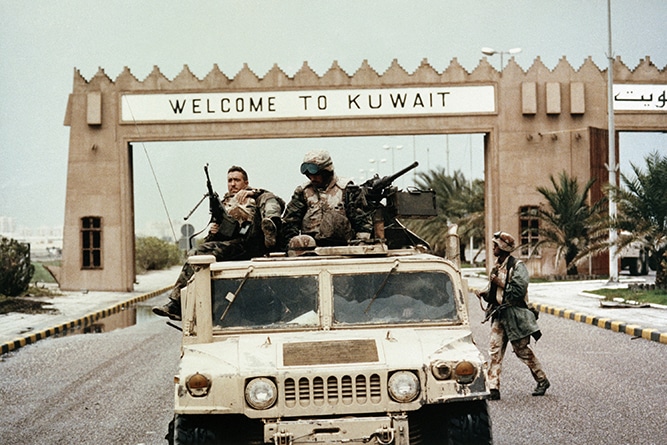By Majd Othman
On August 2, 1990, Kuwait woke up to a terrifying invasion by Iraq, which caused a major shock on the international and local levels. In a couple of hours, the country was under brutal occupation. While the invasion aimed to annex Kuwait to Iraq, with Saddam Hussein claiming it as one of Iraq’s governorates, the main reason behind this invasion was the important recourses Kuwait has - oil or so-called black gold.
For seven months, Kuwaitis and residents lived in severe conditions, and only with a great resistance, in addition to the role of allied countries, most importantly the United States, Kuwait was liberated on February 26, 1991. Kuwait Times spoke to Public Affairs Officer of the US Army (ASG-Kuwait) Claudia LaMantia to discuss with her the role of the US military during ‘Operation Desert Storm’ to liberate Kuwait, which strengthened the relationship between the US and Kuwait since that day.
 Claudia LaMantia
Claudia LaMantia“The mission was simple - it was about pushing the Iraqis back to their country and repel them from Kuwait. That looked very easy, it wasn’t. Great cooperative work was done between all allied countries. The US military’s cooperative work to support Kuwait started from the army, marine corps, navy and the air force. The coordination was filled with a lot of planning, as we divided back then into two groups, Desert Shield and Desert Storm. Operation Desert Shield’s main role was to build up; bringing everyone here and making sure everybody had lanes they were going to,” LaMantia said.
She explained the US navy played an important role in providing logistical support, which was “a lot”, pointing out that it was “the biggest movement of forces we had in US since the Second World War”. “This was due to former US president George H W Bush, who stressed on the importance of our mission to succeed and repel the Iraqi army back to their country,” she said.
Brutal invasion
LaMantia said despite the short period of the occupation of Kuwait from a military point of view, it was a brutal invasion. “Several witnesses stories revealed the violence against citizens back then, starting from killing them indiscriminately and very cruelly, hanging some people, chopping them, hanging them in the streets and even taking them away from their families to Iraq and killing them there,” she said, “not to mention stealing household items and causing people a huge financial crisis as a result.”
LaMantia explained the Iraqi army’s retreat. “The Iraqi army was considered back then among the top seven armies, and the US mission wasn’t that easy to push them back to their country. But the Iraqi army struggled with challenges - their logistical support was not strong enough, as the army could not fight more than three days without drinking or eating, and it wasn’t surprising they did not put up more of a fight and decided to retreat,” she told Kuwait Times. “In addition, it is hard to fight for something you don’t believe in. It is also hard to believe and fight for something if you are not provided with basic needs, such as food and water in this case.”
 In this Nov 22, 1990 file photo, US President George Bush poses with soldiers during a stop at an airbase in Dhahran, Saudi Arabia.
In this Nov 22, 1990 file photo, US President George Bush poses with soldiers during a stop at an airbase in Dhahran, Saudi Arabia.After the invasion
LaMantia spoke about the time people started to visit Kuwait after the invasion, and explained her experience at that time. “When I arrived in Kuwait, I remember I visited the National Museum and was amazed with the artwork done by Kuwaiti prisoners in Iraq who came back to Kuwait, as they described what they had witnessed and gone through during the invasion and being tortured in prison. They were sad paintings, calling on other prisoners to come back to Kuwait. I also visited houses where fighting and resistance happened, not to mention Kuwaitis who were killed there. Despite the overwhelming forces, they fought for their country,” she recalled.
“After the invasion and Desert Storm, the relationship between both countries developed and there was more cooperative work, as well as the establishment of Doha Military Camp that played an important role during the invasion of Kuwait” LaMantia said.











